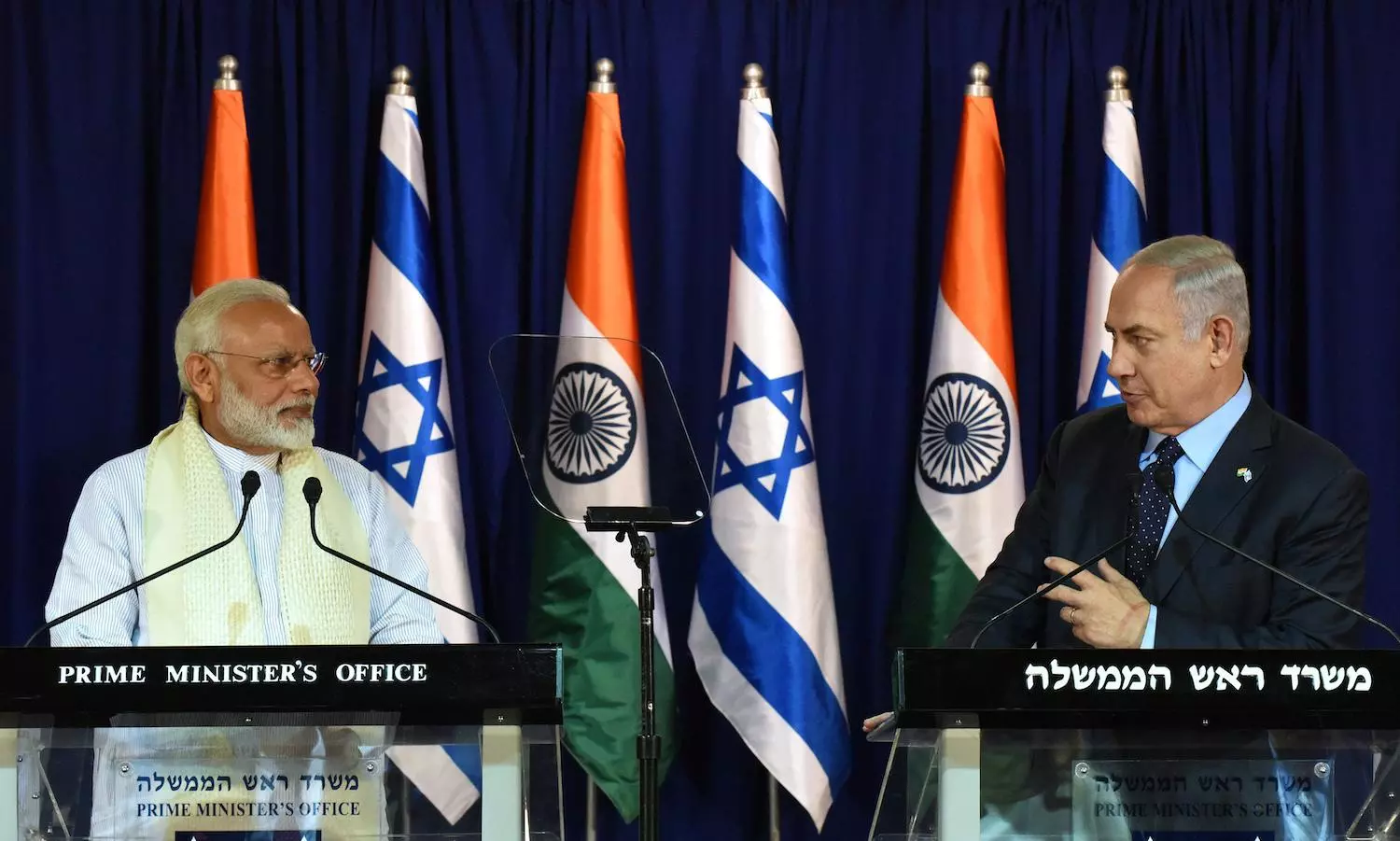

Indian Prime Minister Narendra Modi and Israeli Prime Minister Benjamin Netanyahu make a joint statement at Netanyahu’s residence in Jerusalem on July 4, 2017. DEBBIE HILL/AFP/GETTY IMAGES
India's evolving policy on Israel-Palestine conflict
text_fieldsThe advent of the BJP rule in India has been a key turnaround in the India-Israel relationship. Since the coronation of a right-wing government led by Narendra Modi, India has resonated with Israel ideologically and diplomatically. Hindu right-wing in India has historically repudiated India's pro-Palestine posturing. They consider both India and Israel as the victims of terror emanating from the Arab world.
Modi's tenure witnessed India taking atypical positions on various resolutions regarding the Israel-Palestine conflict. India voted in United Nations Human Rights Council to initiate an inquiry into the human rights violation during the 2014 Gaza war. Still, when the commission report on the same was published, India abstained from voting. This was not a standalone instance; India had voted for a resolution condemning Israel for violation of religious freedom of Muslims at their holy sites in 2016 but abstained from further proceedings on this issue. In 2019, India voted along with Israel against the United Nations Economic and Social Council (UN ECOSOC) opposing granting of observer status to Palestinian human rights organization named 'Shahid'.
India's Response to the Current Escalation
The recent Israel-Palestine conflict, unlike previous ones, stood in the limelight due to the polarised responses along communal lines and evolving nuances in India's approach to the issue. The Hindu right-wing distorted the issue as a conflict along 'religious' and not political lines, supporting Israel in the process. However, to their disenchantment, the Indian flag was not among the 25 flags tweeted by Benjamin Netanyahu, which he said were countries 'resolutely standing with Israel and supporting our right to fight back.'
At the United Nation's Security Council session held to discuss the Gaza attacks, India attempted a delicate balancing act by reaffirming support for the Palestine cause without abandoning its new friend Israel. India's Permanent Representative to the UN, T. S. Tirumurthi, reiterated India's support to Palestine's cause and unwavering commitment to the two-state solution. India also expressed deep concerns over the attempts by Israel to unilaterally change the existing status quo by initiating an eviction process in Shaikh Jarrah and deploying troops in the Al Aqsa compound, eventually leading to violence during the holy month of Ramadan. India had no bone in stating that the trigger of the latest escalation was the clash in East Jerusalem and Al-Aqsa Mosque and not the rocket firing by Hamas.
India refrained from upsetting Israel's sensitivity by condemning the indiscriminate fusillade of the rocket by Hamas targeting the civilian population before condemning Israel's sanguinary attacks on Gaza but did not refer to the disproportionate intensity of bombing Israel carried out in Gaza. India abstained from voting on a UN Human Rights Council (UNHRC) resolution on May 27 to set up a permanent commission to probe human rights violations in Gaza, Israel, and the occupied West Bank.
However, the crux of the Indian argument of a two-state solution, that East Jerusalem should be the capital of future Palestine state, was missing in T. S. Tirumurthi's statement. India dropped referring to East Jerusalem after Jerusalem was recognized as the capital of Israel by former President of America, Donald Trump, in 2017. A similar practice was followed in Modi's statement during the visit of Palestine President Mahmoud Abbas in 2017 and during Modi's visit to Ramallah in 2018.
A closer look at the syntax of the statement delivered by India reveals the underlying nuances in India's evolving Israel-Palestine policy. P.R Kumaraswamy, Professor of International Studies at JNU, says that Haram-el-Sharif has been referred to as Haram-el-Sharif/Temple Mount. This is a subtle way of saying that India doesn't stand with the Palestinian narrative. The Palestinian narrative that it is Haram-el-Sharif means exclusive Islamic control and ownership. By saying it as Haram-esh-Sharif along with Temple Mount, India legitimizes Israeli claims as well. Further, India identifies the turn of events in East Jerusalem as the instigator of the clash. Still, it takes a disproportionate view to the rocket firings from Gaza and Israel, undermining the casualty and magnitude of airstrikes by Israel.
Conclusion
The cycle of violence between the two countries is not the first nor likely to be the last. History has been reprehensible to Palestine, so is the protracted war of attrition, which has been deteriorating Palestine. In the holy land of three Semitic religions, all but peace prevails.
India, which historically has been an ally to the Palestine cause, has resorted to a balancing act on issues concerning Israel and Palestine. But this act is a repudiation of India's historical worldview and it disregards the harsh realities which are skewed against Palestine. By compromising on India's longstanding policy by not acknowledging Eastern Jerusalem as the capital of Palestine, which is the crux of the 'two-state solution, India blemishes the geographical validity of the solution itself. India, with her history pulling through the partition, which essentially was a political issue with religious dimension, to build an inclusive, secular democracy, can act as the viable model for the peaceful coexistence of formerly antagonistic groups. For this to materialize, India must relinquish its balancing act and call a spade a spade.






















